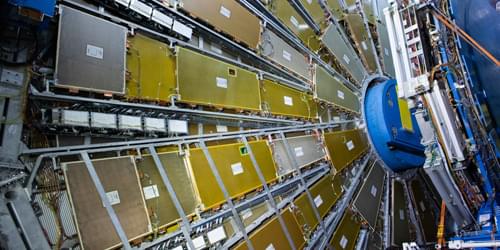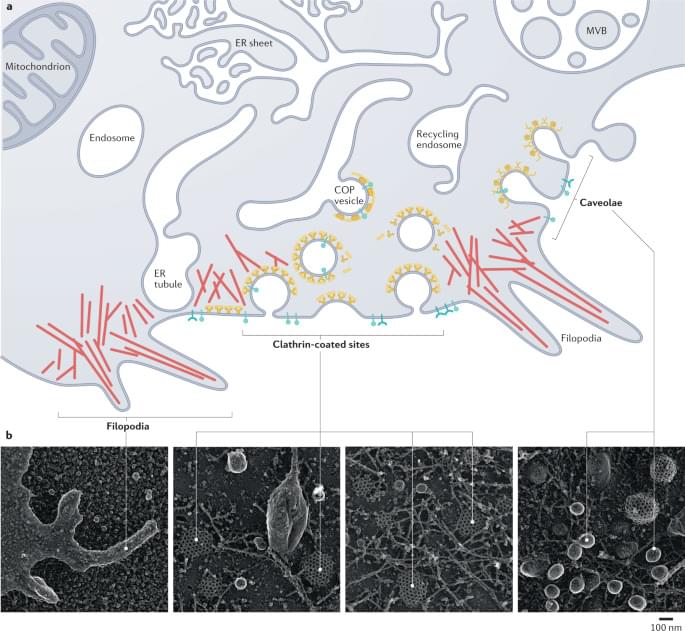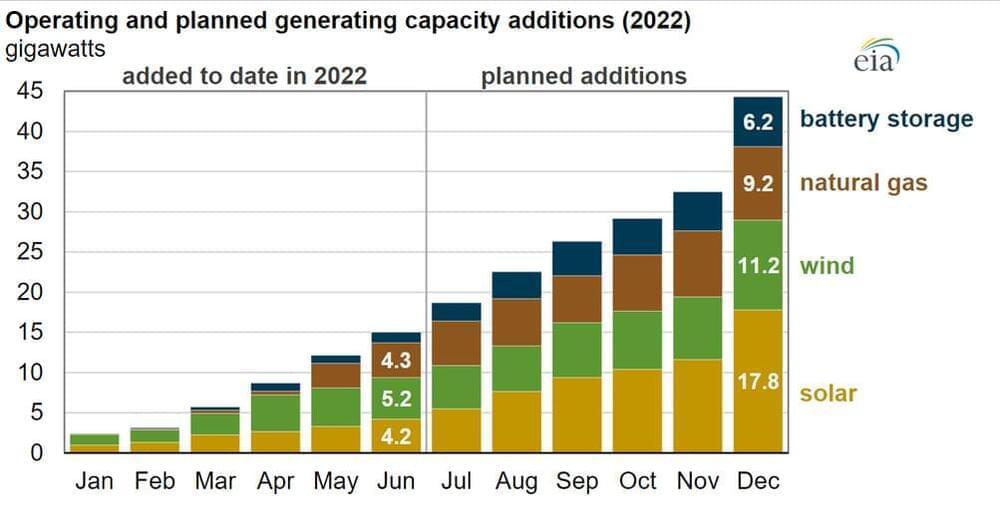The ATLAS Collaboration has detected triple W-boson production—a rare event that could eventually offer signs of new physics.
A new model suggests that lattice defects are responsible for the way some semiconductors become harder under illumination.


A new model suggests that lattice defects are responsible for the way some semiconductors become harder under illumination.
Understanding how semiconductors respond to illumination has been crucial to the development of photovoltaics and optical sensors. But some light-induced behaviors have been less thoroughly investigated. For example, when some semiconductors are illuminated, their mechanical properties can change drastically, a phenomenon known as photoelasticity. Photoelastic materials could be useful in the development of flexible electronics, but researchers do not understand in detail the mechanism behind the effect. Now, based on experiments and simulations, Rafael Jaramillo of the Massachusetts Institute of Technology and colleagues present a new theoretical framework that explains photoelasticity in terms of lattice defects [1].
The researchers used a diamond-tipped probe to make nanometer-scale indentations in samples of zinc oxide, zinc sulfide, and cadmium sulfide—first in the dark, and then under a range of visible and ultraviolet wavelengths. All three materials hardened to varying degrees when illuminated, with cadmium sulfide showing the largest and most consistent response. For every sample, the effect increased as the photon energy increased toward the material’s band gap.

Long-baseline neutrino experiments are paving the way for the solution of two outstanding puzzles in neutrino physics—mass ordering and charge-parity violation.
Nanoparticle “backpack” repairs damaged stem cells. Stem cells that might save a baby’s life and be utilized to treat illnesses like lymphoma and leukemia are found in the umbilical cord of newborns. Because of this, many new parents decide to preserve (“bank”) the umbilical cord blood’s abundant s.

Stem cells that might save a baby’s life and be utilized to treat illnesses like lymphoma and leukemia are found in the umbilical cord of newborns. Because of this, many new parents decide to preserve (“bank”) the umbilical cord blood’s abundant stem cells for their child. However, since gestational diabetes destroys stem cells and makes them useless, parents are not given this choice in the 6 to 15% of pregnancies who are impacted by the illness.
In a study that will be published in the journal Communications Biology, bioengineers at the University of Notre Dame have now shown that a new approach may heal the injured stem cells and allow them to once again grow new tissues.
Specially-created nanoparticles are the key component of this new strategy. Each spherical nanoparticle may store medication and deliver it specifically to the stem cells by attaching it to the surface of the cells. These nanoparticles are about 150 nanometers in diameter or about a fourth of the size of a red blood cell. The particles deliver the medication gradually as a result of their unique tuning, which makes them very effective even at very low dosages.

A multinational research team has now been able to increase their understanding of species-specific variations in the architecture of cortical neurons thanks to high-resolution microscopy.
Researchers from the Developmental Neurobiology research group at Ruhr-Universität Bochum, led by Professor Petra Wahle, have demonstrated that primates and non-primates differ in an important aspect of their architecture: the origin of the axon, which is the process responsible for the transmission of electrical signals known as action potentials. The results were recently published in the journal eLife.

Archived histological material from tracing studies, immunohistochemistry, and Golgi impregnations allowed to discover a so far unrecognized structural difference, potentially of functional importance, between neocortical pyramidal neurons of rodent, carnivore, and ungulate as compared to monkey and man.
Learn More.
Friends of NASA
Zooming in on the crab nebula | hubble.
FriendsofNASA.org: This video zooms into part of the sky in the constellation of Taurus (The Bull) ending on the inner pa… See more.
The reactors come with safety features designed to prevent the kind of disasters that have hardened public opinion against nuclear power.

While some SMRs under development rely on exotic new designs that use molten uranium or thorium salts as a fuel, the NuScale reactor, which has been named VOYGR, is not dramatically different from traditional full-scale ones. It is based on a design developed at Oregon State University in the early 2000s called the “Multi-Application Small Light Water Reactor.”
The design consists of a 76-foot-tall, 15-foot-wide cylindrical containment vessel that houses the reactor. Water is passed over a series of uranium fuel rods that generate heat through fission reactions. The heated water then rises up towards steam generators, which use the heat from the water to produce superheated steam. This is then used to drive a turbine that generates electricity.
Each module is designed to generate 50 megawatts of energy, but the company plans to combine up to 12 SMRs to achieve similar outputs to conventional nuclear plants. The SMRs come with novel safety features designed to prevent the kind of disasters that have hardened public opinion against nuclear power.

The generation of membrane curvature is essential for the formation of membrane tubules, sheets and vesicles, and hence, underlies membrane trafficking events. Various protein-based mechanisms function in membrane bending, and these appear to be organized in time and space by protein coats, including clathrin, caveolar coat complex, and COPI and COPII coats.

The US power grid is growing! According to our latest inventory of electric generators, 15 gigawatts (GW) of new utility-scale electric generating capacity came online in the United States during the first half of 2022. Based on the most recently reported plans, developers could add another 29 GW of capacity in the second half of the year.
Our Preliminary Monthly Electric Generator Inventory compiles information on all U.S. utility-scale power plants (plants with a nameplate capacity of at least 1 megawatt [MW]) that are currently operating, planning to come online, or retired. The inventory includes all utility-scale plants that have retired since 2002.
We update this inventory once a month with preliminary data and then finalize that data annually with a survey that provides additional information about the power plants. Our Preliminary Monthly Electric Generator Inventory includes information through the preceding month; for example, the inventory published in July includes information through June.